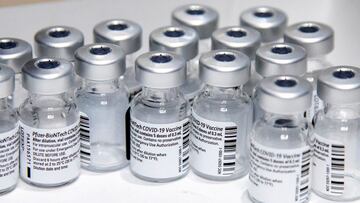Are vaccines for covid-19 safe in the long term?
Reports on vaccine hesitancy, show many don’t trust the safety of the vaccine in the long term, leaving public experts to reexamine how to inform the public on its safety and benefits.

In the United States and its territories, more than 268 million doses of covid-19 vaccines have been administered. More than forty-four percent of residents have received at least one dose, and a little over a third are fully vaccinated. Vaccination among those sixty-five and older continues and since 29 April, the percent of seniors vaccinated has increased three percent to 63%.
Vaccine safety
Although the covid-19 vaccines available were developed on a timescale never seen before, the science and technology needed to create them are over twenty years in the making. In order to expedite the vaccine approval process, the US government allowed stages to occur simultaneously -- cutting a process that can take more than five years down to less than one.
To build trust with the public, the US Center for Disease Control and Prevention (CDC), has stated that vaccines available to those in the US today, “have undergone and will continue to undergo the most intensive safety monitoring in U.S. history. This monitoring includes using both established and new safety monitoring systems to make sure that COVID-19 vaccines are safe.” Additionally, the health organization pointed to data from previous vaccine studies to show that long-term effects from vaccines are exceedingly rare and that most “generally happen within six weeks of receiving a vaccine dose.” Based on this past evidence, the Food and Drug Administration “required each of the authorized COVID-19 vaccines to be studied for at least two months (eight weeks) after the final dose.”
The buck does not stop there. As millions receive their doses each day, the CDC continues to monitor the vaccination process to ensure that if adverse side effects do arise, they can be addressed quickly. For example, after a series of clots were reported after seven patients received the Johnson & Johnson vaccine, the FDA and CDC decided to pause the use of the vaccine. One more evidence and information was collected, and their teams determined it was safe to use, the J&J single-shot vaccine was made available to the public again.
Why are people hesitant to get a vaccine?
The University of Pittsburg released results of an online survey they conducted and that found nearly half of adults under sixty-five are hesitant to receive a covid vaccine. Although public health experts have tried to quell nervousness around vaccine side effects, survey respondents cited possible side effects as one of the main reasons for their hesitancy. More than a third of those polled also stated that their “distrust of government” made them unlikely to receive a vaccine.
Occupation was a major variable that divided those in favor of vaccination and those opposed. The survey found that forty-six percent of those involved in “construction, oil and gas extraction or mining, followed closely by people in installation, maintenance, repair, farming, fishing or forestry careers” reported that they would not be receiving a vaccine. These jobs are overwhelmingly held by men.
Researchers have found that political officials and celebrities are not great vehicles to reduce hesitancy. Rather, reports have shown that local community leaders and trusted figures like doctors and religious leaders may be more effective messengers. Doctors around the country are speaking with their patients about getting vaccinated and many have reported that their patients would be more comfortable receiving the vaccine from them. Based on this information and research, the Biden administration is moving to get more vaccines in the hands of primary care providers.






